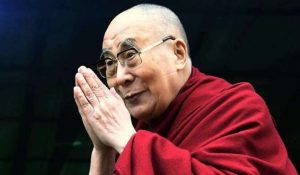
“Modern science is… ” I trail off, inviting a response.
“… is dogmatic,” finishes Ajahn Brahm quickly, without an iota of hesitation. “I’ve known that ever since science has denied the existence of consciousness as an independent entity apart from the brain.” It is as if he knew the answer that a journalist of Buddhism expected. More likely, he had already given many dhamma talks on the subject over the years. “Any reasonable scientist who puts aside their dogma would have to admit that consciousness is all-powerful,” he says. This is the paradigm that modern science and Buddhism have much to dialogue and debate about.
An hour earlier, Ajahn Brahm was waiting inside the Pavilion lounge of the Kowloon Cricket Club. February was, as it has been since 2008, the month for his annual visit to Hong Kong. As we conversed over coffee and tea, he set the clash of science and religion in the context of globalization, environmental catastrophe, and his incredibly ambitious idea of a massive “Asian Union” that could even dwarf the EU. It was difficult not to admire him for so fearlessly wading into matters that many monastics feel corseted by their robes to address. But this is a rapidly changing world in which Buddhism desperately needs to have a voice, and you can only have a voice if you speak out.
Given his background as a Cambridge physics student, it is perhaps not surprising that science is one of his most passionate preoccupations. It is fair to say that Ajahn Brahm has no quarrel whatsoever with the scientific method. “Scientific method is wonderful,” he says. “There are no sacred cows, everything can be challenged. There is nothing which you cannot argue against.” The Buddhist heritage is actually closer to scientific culture than many would expect. According to scholar Christopher Beckwith, scientific culture was inherited by Islamic and Latin European civilization from the Buddhist colleges (vihara) of Central Asia and the recursive argument structure found in Buddhist texts (my colleagues, John Cannon and Ven. Jnan Nanda, are co-writing a review of Beckwith’s book on this topic). Ajahn Brahm is therefore reclaiming the mantle of a heritage that has, for him, lost its way in the superstition of materialism: an “extreme view” that the Buddha opposed as one that reduces beings to their commercial or physical worth – that is, a being has no inherent or transcendental value.
Like materialism and science, there is a distinction that needs to be drawn between the scientific method and scientific dogma. And what troubles Ajahn Brahm is not science but scientism: the demand that in the dialogue between religion and science, the former must prostrate itself before the latter in ideological and metaphysical concession. Scientism assumes that Buddhism, while having some “non-superstitious” elements, cannot be accepted as a religion, because religion itself is the root evil. Evolutionary biologist David Barash provides a perfect example of this idea in his article “Is Buddhism the Most Science-Friendly Religion?” in Scientific American:
“… In much of the world, Buddhism involves daily ritual devotions, belief in amulets and other special charms, and even the presupposition that the man, Siddhartha Gautama, was a divine being. There are, I regret to note, Buddhist traditions that insist on retaining an array of nonsensical hocus-pocus and abracadabra altogether at odds with any scientific tradition worthy of the name. Among these, the notion of ‘rebirth’ is especially ridiculous, insofar as it implies that after their death, people will eventually reappear in some other form, with their personalities or at least certain ‘karmic attributes’ intact… rather than NOMA (‘Non-Overlapping Magesteria’)… Buddhism offers the bracing prospect of POMA (‘Productively Overlapping Magesteria’) – albeit only after removing Buddhism’s religious mumbo-jumbo… that is, when not treating it as a religion.”
Barash’s demand that Buddhism’s “religious mumbo-jumbo” must be removed is completely understandable. It is sadly symptomatic of the pugilistic, mutual disdain festering between many scientists and religious believers in the United States (a combative divide which Barash himself, who lives and works in America, laments). It is especially unfortunate that this comes as a growing number of Buddhists recognize that to retreat from a conversation from science would consign Buddhism to intellectual irrelevance and atrophy.
In examining how scientism’s zero-sum game is helpful to neither scientists nor Buddhists, it might be helpful to revisit the case of the “New Atheists”. The “Unholy Trinity” of Daniel Dennett, Sam Harris, and Richard Dawkins, along with Christopher Hitchens (a vocal critic of Buddhism), was supposed to herald the death of religious credibility, and along with it religious confidence and institutions. Yet it is apparent that the triumphalist case put forward by New Atheism was unable to accomplish the decisive victory it intended. The global debate remains as raw and inflamed as ever. And in a few short months last year, Pope Francis seriously challenged the caricature of religion Hitchens and Dawkins favored in their polemics and debates. Barash’s demand that Buddhism cease to be a religion also stifles the potential for dialogue with Buddhists who are committed to their tradition and open to science. It is eerily reminiscent of how the rhetoric of New Atheists (otherwise extremely erudite and accomplished thinkers) troubled moderate Jews, Christians, and Muslims, who could have been their most influential allies.
This is not to say Buddhism does not suffer from “superstition”. Ajahn Brahm notes that it indeed does: “Everyone must throw away hocus-pocus. But the biggest hocus-pocus is coming from science.” And here he is not assuming that religious belief is perfect. “The fundamentalist religions believe in such untenable things,” he qualifies, and the superstition of materialism affects both science and Buddhism. Increasingly, Buddhists are growing more mindful of “spiritual materialism”, the attachment to practicing Buddhism as a sole means to recognition, blessings, or fortune, rather than as a commitment to an altruistic way of life and moral thinking.
Barash himself concedes that it is Buddhist ethics and values he is most attracted to, an implicit admission that there is something in Buddhism’s spiritual worldview that a materialist philosophy cannot offer. The real weakness of scientism and materialism is its disregard for the selfless nature of relationships. “Buddhism is all about relationships. Life is all about relationships, anatta (self-lessness),” says Ajahn Brahm. If one is able to accept that the sentient being is of supreme value – a Buddha-to-be – then it only makes sense that a mutually respectful relationship between scientists and Buddhists is the only way Buddhists can become more scientific, and scientists more Buddhist.













i agree.
according to materialists life has no transcendent meaning.
so why should we do so called “humanistic” works after all.
Though i am highly skeptical of modernist Buddhism, I appreciate that Buddhism is most science friendly because of its causal nature.
it denies any first cause or intelligent design pseudoscientific theories or any fine tuning.
it also breaks down what we call soul into perceptions, sensations ,consciousness and mental formations. After breaking these i understand they enter into nirvana( a state of being one with universe.
i call buddhism scientific not because of alleged connections with quantum physics but because of its theory of dependent origination which states that nothing has independent existence.
concluding,
I feel that Buddhism should abandon the practices of worshipping deities to become a pure religion.
its all karma no deity can help you.
best of luck to all buddhist monks.
OM MANI PADME HUM.